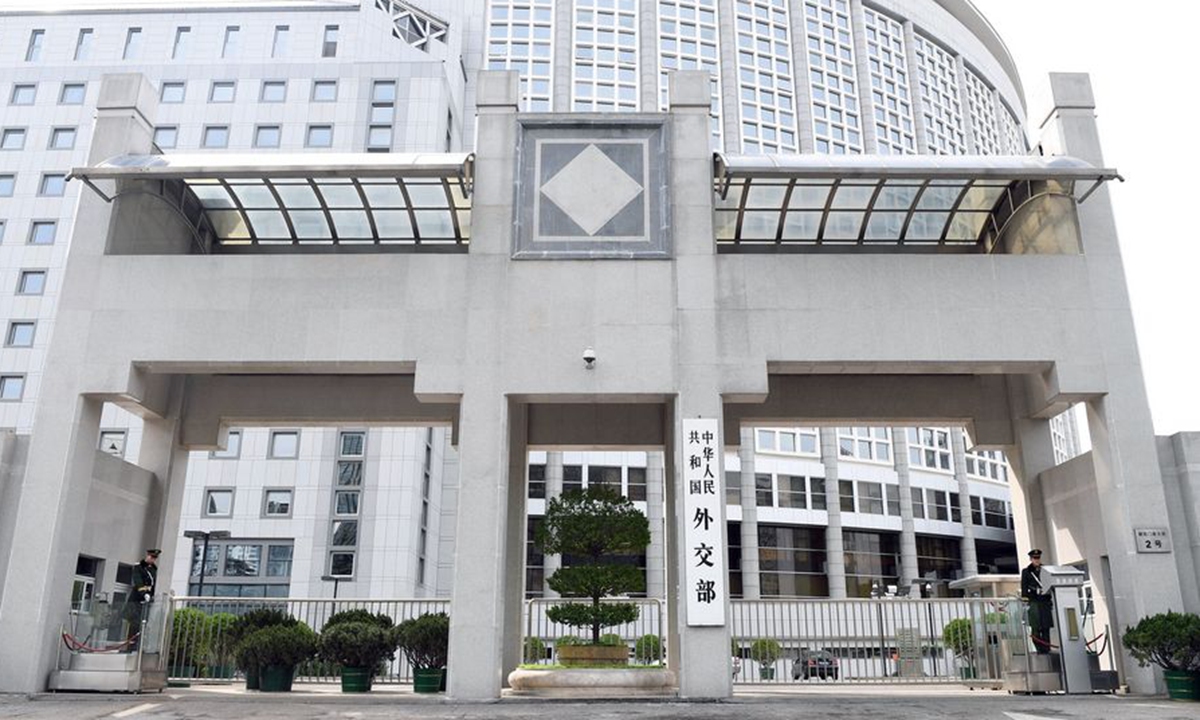
The Chinese Foreign Ministry in Beijing Photo: Xinhua
The Chinese Foreign Ministry on Thursday urged the US and the EU to abandon the Cold War mentality, after the US State Department announced on Wednesday that US Deputy Secretary of State Wendy Sherman and Secretary General of the European External Action Service Stefano Sannino will host the second US-EU Dialogue on China.
The US and Europe are now struggling to deal with challenges from China and Russia at the same time. NATO Secretary-General Jens Stoltenberg said on Wednesday that the Western alliance was working closely to protect allies against new Chinese and Russian missiles that can reach Europe and North America.
There have always been forces in the US and Europe to sell the "China threat" theory. However, Russian President Vladimir Putin has slammed the "China threat" theory hyped by the West. "People have been trying to spook me and intimidate me with China starting in 2000. Since then, those who tried to spook me, they got afraid themselves and they tried to change their policies toward China," Putin said at the 13th Annual Investment Forum "Russia Calling!" on Tuesday.
Washington and Brussels hosted the first high-level meeting of the US-EU dialogue on China on May 26 and issued a joint statement after the meeting addressing issues concerning China and Russia at the same time. "A joint statement will be released at the conclusion of the session, and the US expects the statement to be 'robust' and to cover a range of topics far broader and more detailed than the first joint statement released in May," a US official said in a preview of the meeting on Thursday.
"This reflects the increasingly convergent US and EU outlook on China and its increasingly concerning behavior. And it demonstrates the effectiveness of our approach to rebuild our alliances and partnerships as we compete with China," the official added.
However, Cui Hongjian, director of the Department of European Studies at the China Institute of International Studies, told the Global Times on Thursday that it cannot be interpreted as the EU "following" the US on its China policy.
In fact, what the EU wants to achieve is a positive interaction and mutual influence with the US to achieve an equal relationship. When it comes to positioning on China, Europe may actually have more influence on the US. "Europe believes that its views and interests should be respected, and that it will eventually reach a compromise with the US, rather than simply following the US," Cui said.
Observers noted that even within the EU, countries differ in their foreign policy toward China depending on their economic and trade cooperation with China and the distribution of benefits. Therefore, achieving equilibrium between conflict and cooperation is vital for European countries, and this is where the divisions and contradictions within Europe lie.
In fact, there are already many differences between the US and Europe on their policy for dealing with China and Russia. On the one hand, the EU needs Russia's help on many issues including security, energy and climate, but on the other hand, Europe has a kind of "non-independence" in their foreign policy, which leaves them no other choice but to sway with the US on certain issues, Yang Jin, associate research fellow at the Institute of Russian, Eastern European and Central Asian Studies under the Chinese Academy of Social Sciences, told the Global Times on Thursday.
Latvia's prime minister on Wednesday accused Russia of seeking to destabilize and split Europe with a series of actions including its latest build-up of troops on the border with Ukraine.
"Many times, when the US imposes sanctions on Russia, Europe will take similar actions, but most of the time, such 'dancing' with the US is to the detriment of Europe's own interests," Yang said.
The official said Taiwan was also expected to be a topic for discussion amid its plans to open a representative office in the capital of EU member state Lithuania.
China has urged relevant parties to abandon the Cold War mentality, adhere to openness, cooperation, dialogue and consultation, practice genuine multilateralism and inject more stability and positive energy into the world, Yang noted.
